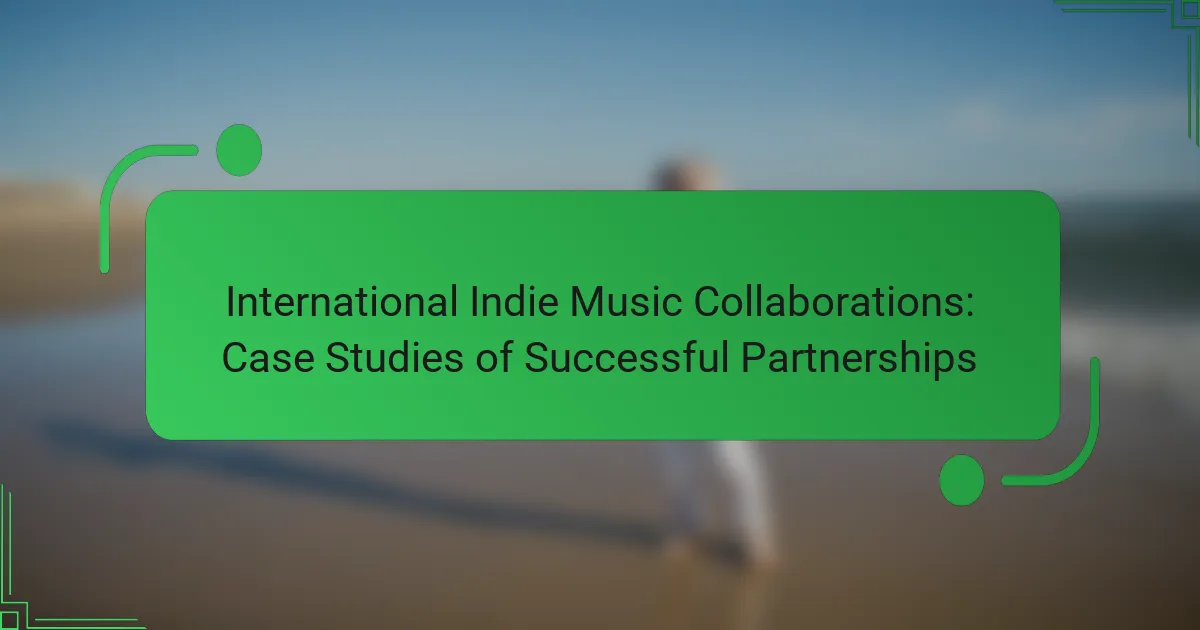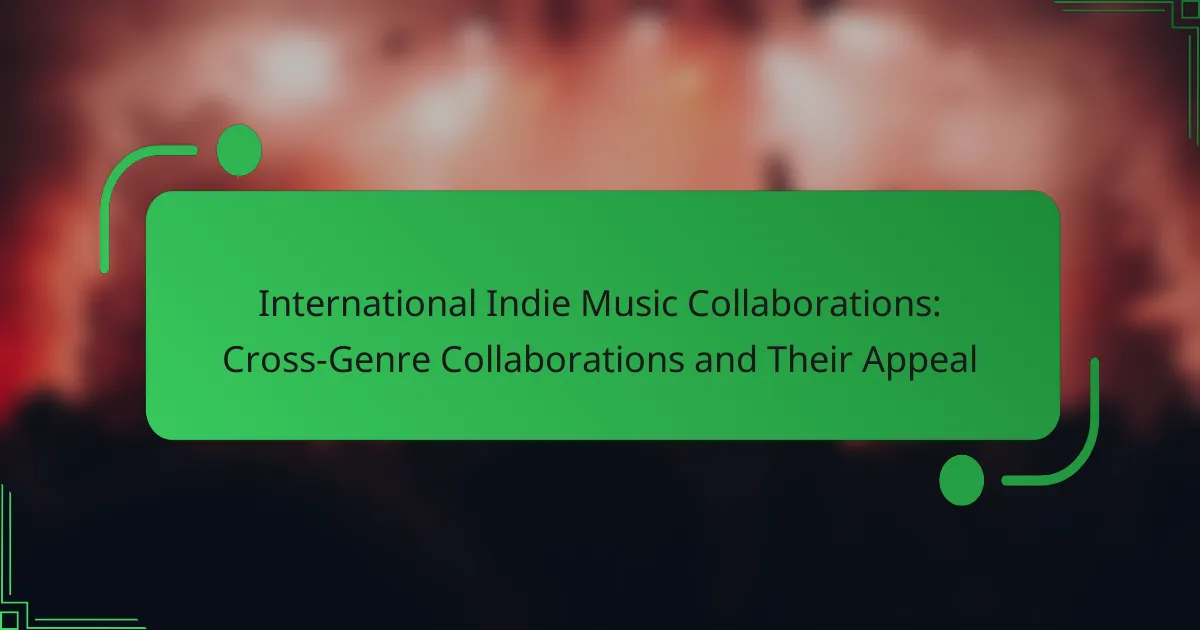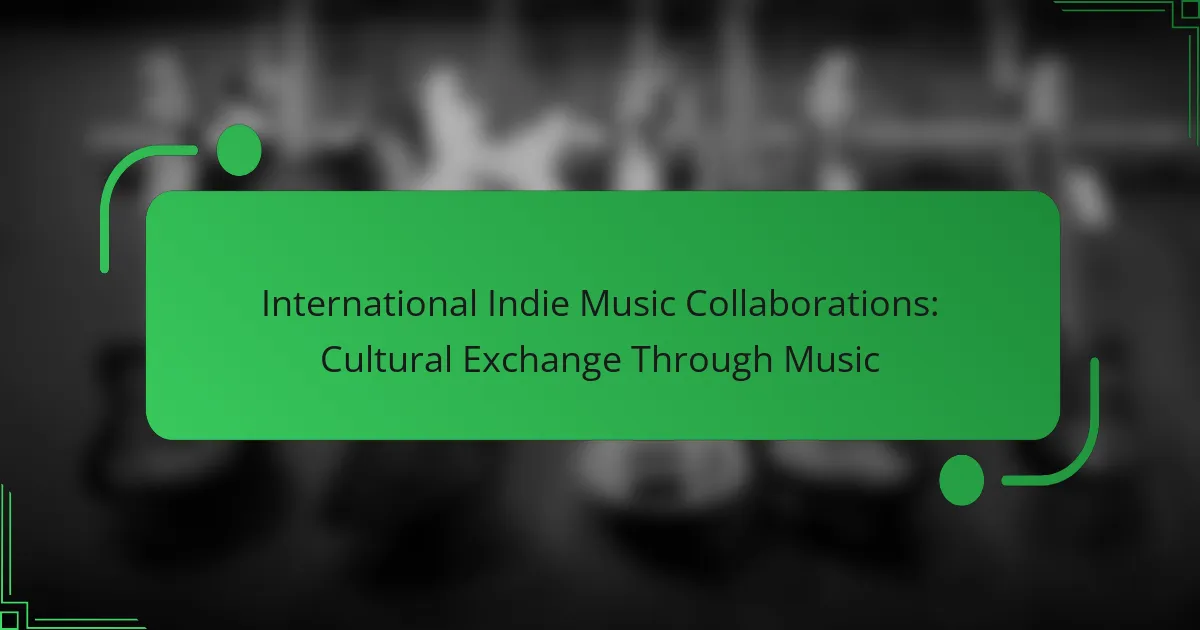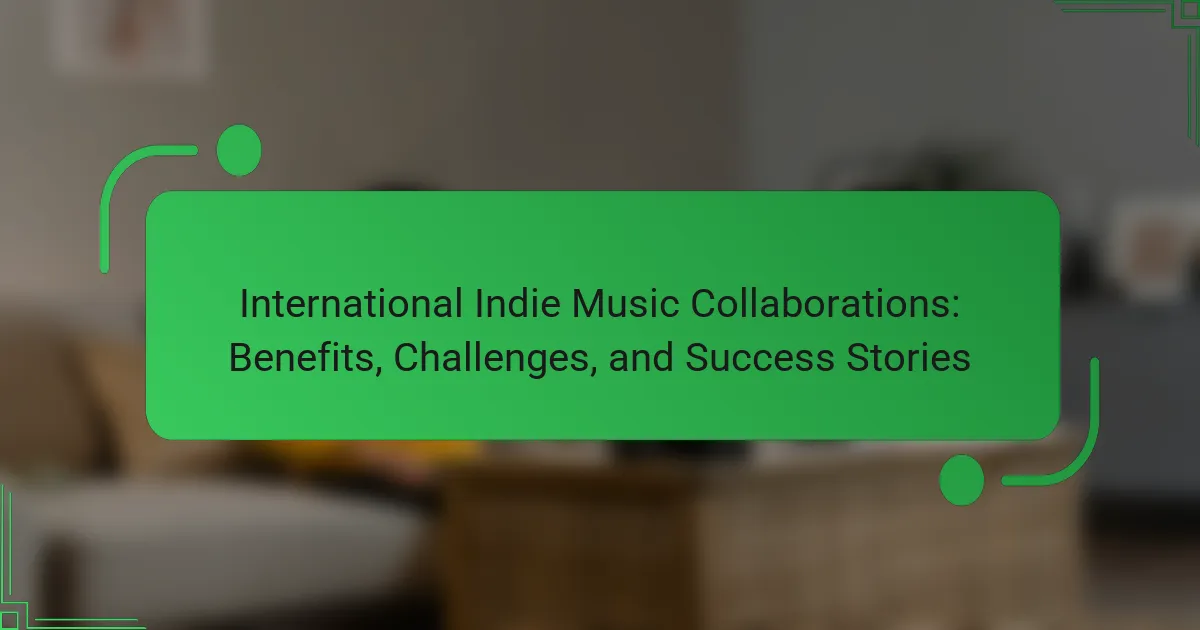International indie music collaborations face challenges in securing funding and support. Key funding sources include grants, crowdfunding, and sponsorships. Support systems such as mentorship programs and networking platforms enhance collaboration opportunities. Understanding these resources can empower indie musicians to navigate the complexities of international projects effectively.
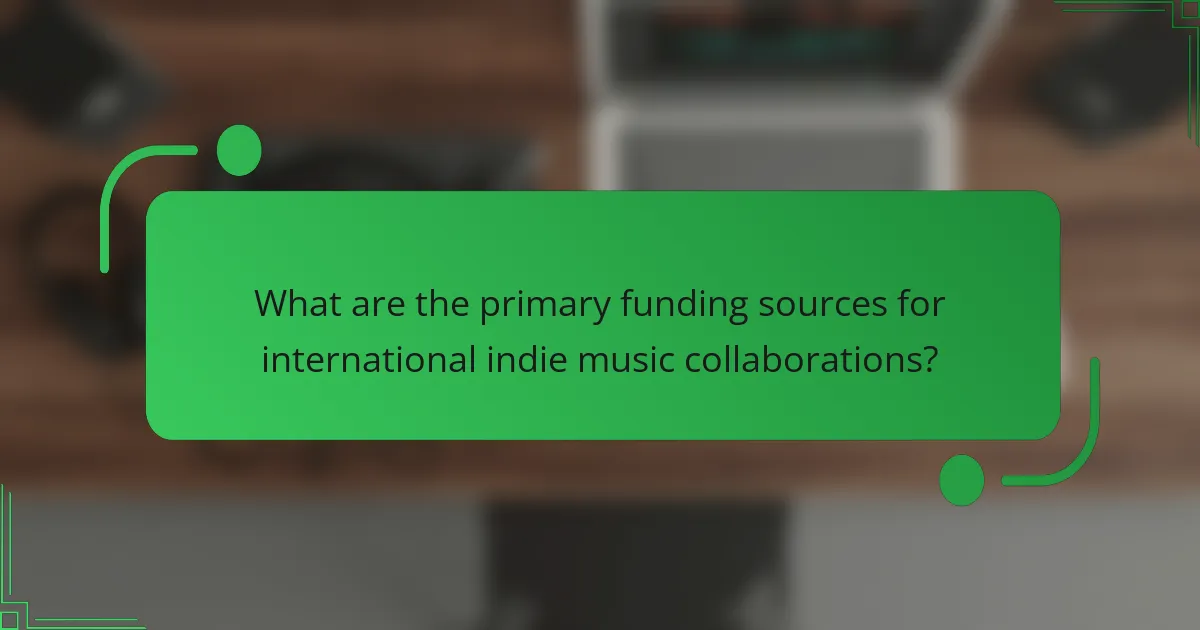
What are the primary funding sources for international indie music collaborations?
International indie music collaborations primarily secure funding from grants, crowdfunding, sponsorships, and music festivals. Grants from arts councils and cultural organizations support projects that promote diversity and innovation. Crowdfunding platforms enable artists to engage directly with fans for financial backing. Sponsorships from brands enhance visibility and provide financial support. Music festivals often offer funding opportunities for collaborative projects, fostering a vibrant indie scene.
How do government grants support indie music initiatives?
Government grants significantly enhance indie music initiatives by providing essential funding and resources. These grants facilitate international collaborations, enabling artists to access new markets and audiences. They often cover production costs, marketing, and touring expenses, which are critical for independent musicians. For instance, programs like the Arts Council England offer funding specifically aimed at supporting innovative music projects. Additionally, grants can foster partnerships between artists from different countries, enriching the cultural landscape and promoting diversity in music.
Which private organizations offer funding for indie music projects?
Several private organizations provide funding for indie music projects, including the following:
1. **ASCAP** – Offers grants for music creators through various programs.
2. **BMI** – Provides funding opportunities for emerging artists and songwriters.
3. **The Music Foundation** – Supports independent musicians with financial assistance.
4. **The Future of Music Coalition** – Offers grants and resources for innovative music projects.
5. **The Arts Council** – Funds creative projects, including music, through various grants.
6. **Sonicbids** – Connects artists with opportunities, including funding and exposure.
These organizations enhance the indie music landscape by supporting diverse creative initiatives.
What role do crowdfunding platforms play in financing indie music collaborations?
Crowdfunding platforms play a crucial role in financing indie music collaborations by connecting artists with potential supporters. These platforms enable musicians to raise funds directly from fans, allowing for creative freedom and independence.
By utilizing crowdfunding, indie artists can gather financial resources to cover production costs, marketing, and distribution. This method fosters community engagement, as fans feel invested in the artists’ projects.
Additionally, successful campaigns often lead to increased visibility and networking opportunities within the music industry. Platforms like Kickstarter and Patreon have become instrumental in facilitating these collaborations, offering a unique funding source that traditional methods may not provide.
In summary, crowdfunding platforms significantly enhance the financial landscape for indie music collaborations, empowering artists to pursue innovative projects while building a loyal fan base.
How do sponsorships and partnerships enhance funding opportunities?
Sponsorships and partnerships significantly enhance funding opportunities by providing access to resources, networks, and shared marketing efforts. These collaborations enable indie music projects to attract financial support from brands seeking exposure to new audiences. For instance, partnerships with established artists can lead to increased visibility and credibility, resulting in higher funding potential. Additionally, sponsors may offer financial backing in exchange for promotional opportunities, creating a mutually beneficial relationship that boosts project viability.
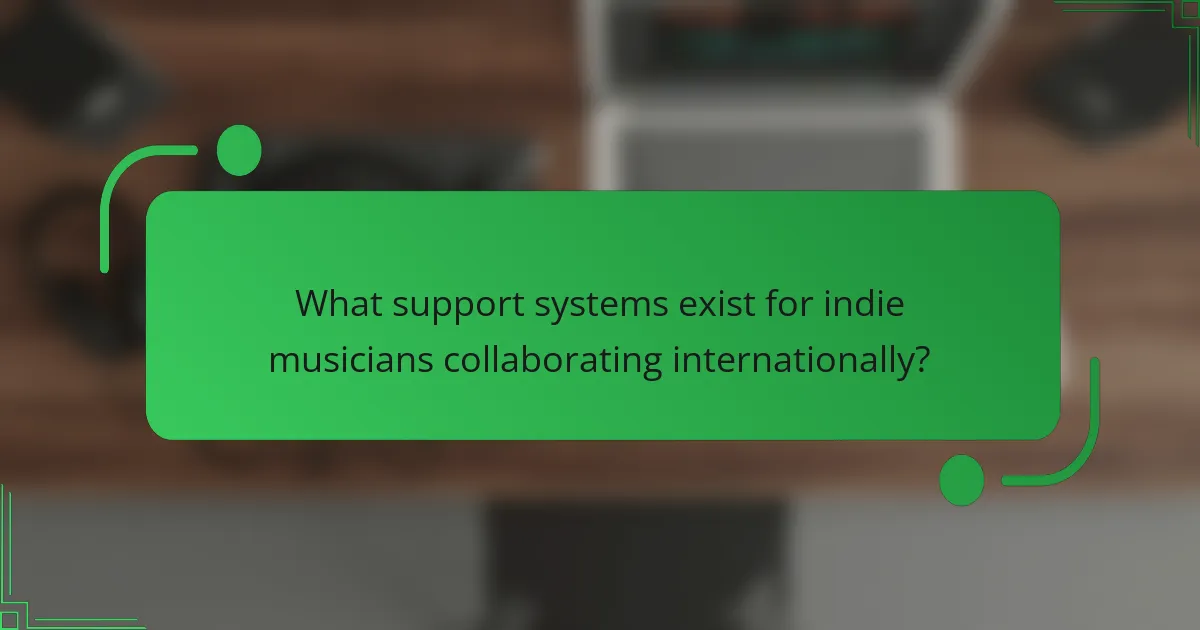
What support systems exist for indie musicians collaborating internationally?
International indie musicians can access various support systems for collaboration, including funding grants, mentorship programs, and networking platforms.
Funding sources like the Music Export Fund provide financial assistance for international projects. Organizations such as the International Federation of the Phonographic Industry (IFPI) offer resources for cross-border collaborations. Mentorship programs, including those from the Musicians’ Union, connect emerging artists with experienced professionals. Networking platforms like Sonicbids and ReverbNation facilitate connections between indie musicians globally.
Additionally, regional initiatives often support local artists in international endeavors, enhancing collaboration opportunities. These systems help indie musicians navigate the complexities of global partnerships.
How do music festivals facilitate international collaborations?
Music festivals facilitate international collaborations by providing platforms for artists to connect, share resources, and access funding. These events often attract diverse participants, enhancing cultural exchange and creative partnerships.
Funding sources for these collaborations include grants, sponsorships, and ticket sales, which help support artists’ travel and project costs. Support systems, such as mentorship programs and networking opportunities, further strengthen these international ties.
For example, festivals like South by Southwest (SXSW) and Glastonbury actively promote cross-border collaborations by featuring international acts and encouraging co-productions. As a result, artists gain exposure and can create innovative works that resonate globally.
What impact do artist residencies have on cross-border music projects?
Artist residencies significantly enhance cross-border music projects by providing artists with resources and networking opportunities. These residencies facilitate collaboration by offering funding, mentorship, and access to diverse cultural perspectives. For instance, artists can explore new genres and styles, enriching their work through international influences. Additionally, residencies often support the creation of innovative projects that may not be possible without financial backing, fostering a vibrant global music scene.
How can music networks and associations assist indie artists?
Music networks and associations support indie artists by providing funding sources and essential resources. They facilitate international collaborations, which enhance exposure and creative opportunities. These organizations often offer grants, mentorship programs, and networking events that connect artists with industry professionals. Additionally, they may provide platforms for showcasing talent, thereby increasing visibility and access to new markets. Such support systems are vital for indie artists seeking to navigate the competitive music landscape effectively.
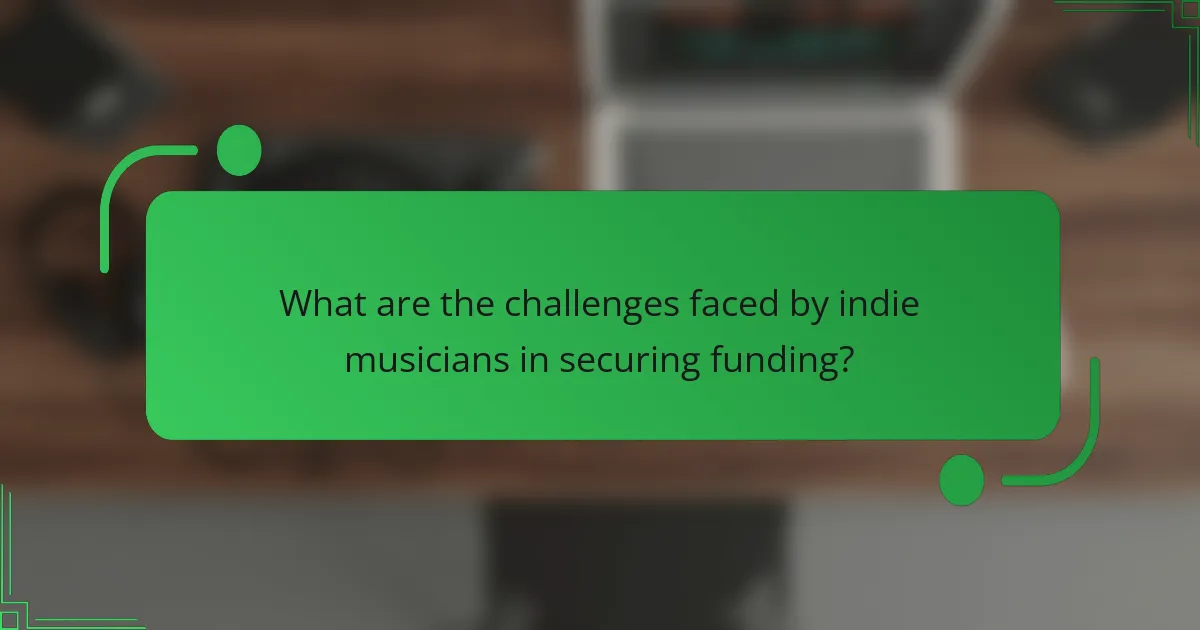
What are the challenges faced by indie musicians in securing funding?
Securing funding poses significant challenges for indie musicians, including limited access to traditional financing and competition for grants. Many musicians lack awareness of available funding sources and support systems. Additionally, the unpredictability of revenue streams from streaming services further complicates financial stability. Networking within the indie music community can help, but establishing connections often requires resources that are not readily available.
How do cultural differences affect funding access?
Cultural differences significantly influence funding access for international indie music collaborations. These differences shape perceptions of value, risk, and collaboration styles, impacting funding opportunities.
For example, in some cultures, collective decision-making is preferred, which may slow down funding approvals. In contrast, cultures that prioritize individual initiative may facilitate quicker access to funds. Additionally, varying levels of governmental support for the arts can create disparities in funding availability across regions.
Cultural attitudes towards music genres also affect funding; certain styles may receive more support in specific regions due to cultural significance or popularity. Understanding these dynamics is crucial for artists seeking funding in diverse cultural contexts.
What common misconceptions hinder funding for indie music?
Common misconceptions about indie music funding include the belief that it lacks support, that it is only for niche audiences, and that funding sources are limited. These misunderstandings hinder access to resources and opportunities. Many assume that indie music cannot attract significant investment, overlooking diverse funding avenues like crowdfunding, grants, and partnerships. Additionally, the idea that only mainstream artists receive substantial backing ignores the growing network of support for independent musicians. As a result, these misconceptions can lead to missed opportunities for collaboration and financial support.
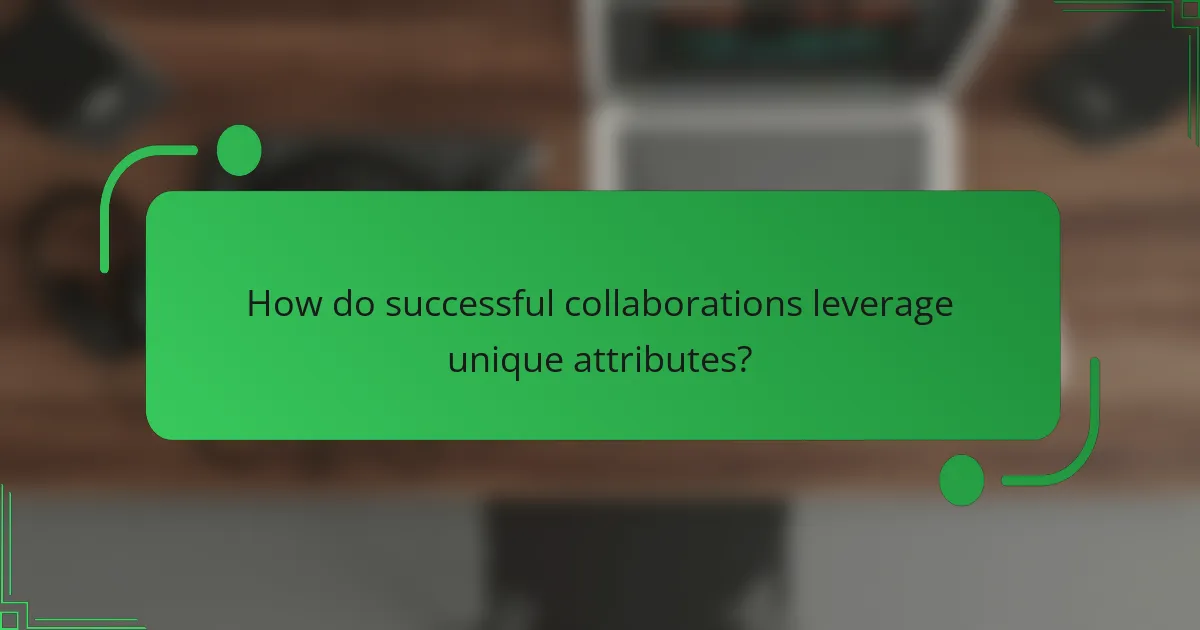
How do successful collaborations leverage unique attributes?
Successful collaborations leverage unique attributes by identifying distinct strengths of each participant. These unique traits enhance creativity and innovation, leading to more impactful music projects. Funding sources such as grants and sponsorships often prioritize collaborations that showcase these unique attributes, increasing the likelihood of financial support. Additionally, support systems like mentorship programs can help artists develop and capitalize on their unique qualities, fostering successful partnerships.
What innovative approaches have emerged in recent indie music collaborations?
Innovative approaches in international indie music collaborations include crowdfunding, digital platforms, and global partnerships. Crowdfunding enables artists to secure funds directly from fans, fostering community support. Digital platforms facilitate remote collaboration, allowing musicians from different countries to create together seamlessly. Global partnerships with brands and organizations provide additional resources and exposure, enhancing project viability. These methods highlight the evolving landscape of indie music, driven by creativity and technology.
Which genres of music are most likely to collaborate internationally?
International indie music collaborations often occur in genres like folk, rock, and electronic. These genres thrive on diverse influences, making them ideal for cross-border partnerships. Collaboration funding sources include grants, crowdfunding, and sponsorships, which support artists in creating and promoting their work. Support systems such as music festivals and international networks further enhance collaboration opportunities, fostering a global indie music community.
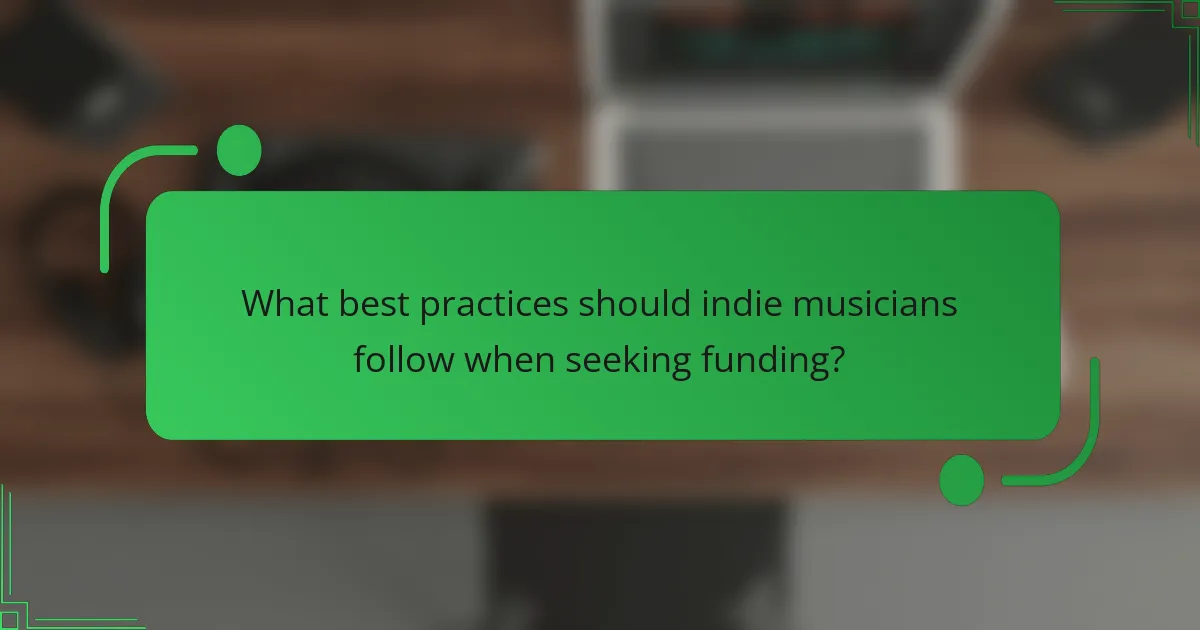
What best practices should indie musicians follow when seeking funding?
Indie musicians seeking funding should explore diverse sources and support systems. First, leverage crowdfunding platforms like Kickstarter or Indiegogo to engage fans directly. Second, apply for grants from arts organizations or music foundations that support indie projects. Third, consider music competitions that offer financial prizes and exposure. Fourth, collaborate with other artists to share resources and reduce costs. Lastly, utilize social media to connect with potential sponsors and build a community around your music.
How can artists effectively pitch their projects to potential funders?
Artists can effectively pitch their projects by clearly articulating their vision, demonstrating the project’s uniqueness, and showcasing potential impact. Start with a compelling narrative that highlights the project’s artistic value and relevance. Use visuals and sound samples to engage funders emotionally.
Research potential funders to align your project with their values and priorities. Tailor your pitch to address their interests, emphasizing collaboration and community engagement. Provide a detailed budget and outline the expected outcomes to demonstrate professionalism and preparedness.
Networking within the indie music community can also lead to referrals and endorsements, increasing credibility. Follow up after your pitch to maintain relationships and show appreciation for their consideration.
What strategies maximize the success of crowdfunding campaigns?
To maximize the success of crowdfunding campaigns for international indie music collaborations, focus on building a strong community, leveraging social media, and offering attractive rewards. Engaging with potential backers through regular updates fosters trust and excitement. Utilizing platforms that cater specifically to music projects can enhance visibility and support. Clear communication of the project’s vision and goals is essential.
How can musicians build sustainable partnerships for ongoing support?
Musicians can build sustainable partnerships by leveraging international indie music collaborations that access diverse funding sources and support systems. Establishing connections with global artists enhances visibility and opens funding opportunities.
Collaborative projects often attract grants, sponsorships, and crowdfunding, enabling musicians to sustain their careers. Utilizing platforms like Bandcamp and Patreon can provide ongoing financial support from fans.
Networking through music festivals and online communities fosters relationships that lead to joint ventures, sharing resources, and co-promotions. These partnerships can enhance artistic growth and lead to unique projects that resonate with wider audiences.
Engaging with local arts organizations and international music networks can provide additional resources and mentorship, ensuring long-term sustainability.
